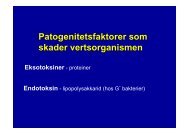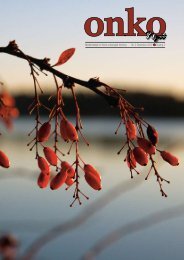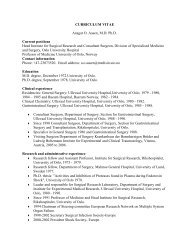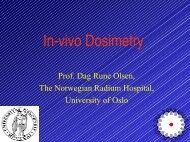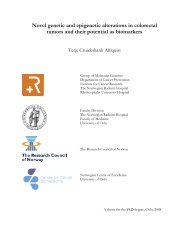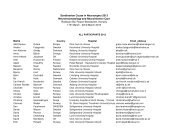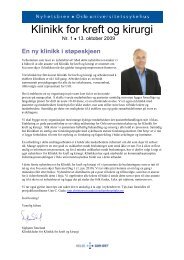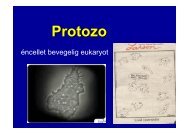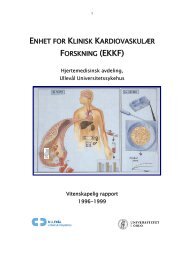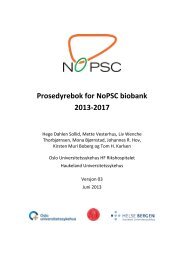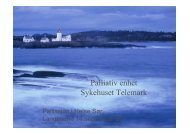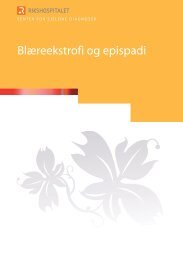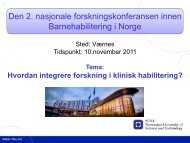Preface - Ous-research.no
Preface - Ous-research.no
Preface - Ous-research.no
Create successful ePaper yourself
Turn your PDF publications into a flip-book with our unique Google optimized e-Paper software.
Cell Transplantation<br />
Leader:<br />
Aksel Foss, Professor, MD, PhD, MHA, FEBS (OUH/UiO)<br />
Scientific staff:<br />
Olle Korsgren, Prof, MD, PhD (Uppsala University)<br />
Hanne Scholz, MSc, PhD, Post doc (OUH)<br />
Tormod Lund, MD, PhD (Sørlandet Hospital, Arendal)<br />
Kristine Kloster-Jensen, MD, PhD student (OUH)<br />
Afaf Sahraoui MD, PhD student (OUH)<br />
Tim Scholz, MD, PhD (OUH)<br />
Trond Jenssen, Prof, MD, PhD (OUH)<br />
Stein Bergan, Prof, MSc, PhD (OUH)<br />
Karsten Midtvedt, MD, PhD (OUH)<br />
Geir Hafsahl, MD, PhD (OUH)<br />
Hilde Hestvåg, Study nurse (CIT-01) (NIH)<br />
Professor Aksel Foss<br />
Introduction<br />
Cell transplantation is a fast growing field in medicine. In<br />
front of a broad area of potential therapeutic options for<br />
cell transplantation is transplantation of insulin producing<br />
pancreatic islets as a feasible alternative for treatment of<br />
unstabile type 1 diabetes. As such the treatment is highly<br />
successful, but several hurdles have to be overcome before<br />
islet transplantation can be a routine treatment for patients<br />
with diabetes.<br />
The first clinical islet transplantation in Norway was performed<br />
at Rikshospitalet in 2001 by Foss and co-workers. The<br />
Research Group for Cell Transplantation has been located<br />
at the Institute for Surgical Research, Rikshospitalet since<br />
2005. From that time on, several articles of experimental<br />
islet transplantation have been published. In 2009 the first<br />
doctoral thesis from the work of the <strong>research</strong> group was<br />
published (Tormod Lund). A master degree was published<br />
in 2008 (Ingrid Aursnes Stølen). Currently, two PhD-students<br />
and one post doc is working full time with experimental<br />
islet transplantation. The Research Group for Cell transplantation<br />
is part of the Nordic Network for Clinical Islet Transplantation<br />
and works in close collaboration with Uppsala<br />
University.<br />
During the last years extensive work has been carried out<br />
to establish facilities for isolation and culture of other cell<br />
types such as hepatocytes, neural cells and even xe<strong>no</strong>-cells,<br />
with the aim of creating a ‘Center for Cell Transplantation’ at<br />
Rikshospitalet. A working group of key individuals from IKF,<br />
the University of Uppsala and the Karolinska Institute have<br />
joined to bring forward a robust inter-Scandinavian collaboration<br />
to address new potential cell therapies and a defined<br />
<strong>research</strong> program has been established. The strength in this<br />
organization is that the people involved are active clinicians<br />
who rapidly are able to transfer new k<strong>no</strong>wledge from<br />
the laboratory into the clinic which is essential in modern<br />
medical science.<br />
For further advance in the field of cell transplantation,<br />
k<strong>no</strong>wledge obtained from islet transplantation <strong>research</strong><br />
is important. Inflammatory reactions are key elements in<br />
islet isolation, culture and transplantation as it is in many<br />
other biological processes. Functional and experimental<br />
studies suggest that that the inflammatory status of cells<br />
and tissues as well as at the implantation site is important<br />
determinants for the outcome of cell transplantation. To<br />
understand and control the processes of inflammation is<br />
therefore necessary for further advances in the field of cell<br />
transplantation.<br />
Pancreatic islets<br />
General Objectives<br />
••<br />
To utilize the present k<strong>no</strong>wledge on clinical islet transplantation<br />
and to induce C-peptide production in unstable<br />
type 1 diabetics, thus improving quality of life and reducing<br />
long term complications of type 1 diabetes.<br />
••<br />
To develop strategies to suppress inflammatory reactions<br />
elicited by islet transplantation and to establish <strong>no</strong>n-toxic<br />
immu<strong>no</strong>suppressive protocols in islet transplantation, able<br />
to induce immune tolerance.<br />
••<br />
To explore and develop striated musculature as an alternative<br />
site for islet transplantation.<br />
••<br />
To obtain methods for in vivo surveillance of islet cell<br />
engraftment, distribution and function by bioluminescentand<br />
PET imaging.<br />
31



